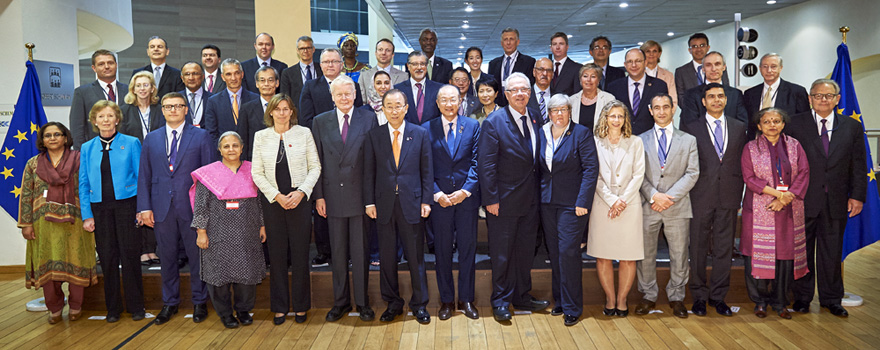“Going Further Faster” is the title of the Sustainable Energy for All Strategic Framework for Results 2016-21, endorsed by the SEforALL Advisory Board at its most recent meeting in Brussels, Belgium on the 15th and 16th June 2016. The Advisory Board, co-chaired by UN Secretary-General Ban Ki-moon and World Bank Group President Jim Yong Kim, brought together over 40 high-level figures from the public and private sectors and civil society who provide overall strategic direction to the Sustainable Energy for All initiative.
Opening the meeting UN Secretary-General Ban Ki-moon emphasised that “energy is the golden thread connecting economic growth and increased social equity” and reminded those present that “sustainable development is simply not possible without sustainable energy”.
The new Strategic Framework will be critical for the delivery of the Sustainable Development Goals, in particular Goal 7 on sustainable energy and Goal 13 on climate change and the Paris Agreement on climate change. Speaking at the meeting President of Iceland, H.E. Ólafur Ragnar Grímsson highlighted that the Paris climate agreement was not just about climate change but it was also about an energy transformation. He pointed out that the transition to zero carbon is possible and that the solutions are locally based stating that “we need to get away from large scale ideas and become locally based bottom up in our approach”.
Introducing the Strategic Framework Rachel Kyte, Sustainable Energy for All’s Chief Executive Officer and Special Representative of the Secretary-General for Sustainable Energy for All, highlighted the need to ”secure an energy transition that is clean, affordable and just – because no one must be left behind.” The new Strategic Framework will take an inclusive, people-centred approach, ensuring that the voices of the energy poor are heard and that women are full participants and beneficiaries.
Mary Robinson welcomed the people centred approach of the strategy saying that “we will not achieve universal energy access without a focus on reaching the furthest behind first. We need to do things differently if we are to succeed”.
She highlighted that achieving Universal Energy Access will require innovative and targeted strategies to ensure that the poorest people and most marginalised communities benefit for access to sustainable energy services. One such approach that can help the poorest people to access energy services is to use targeted social protection systems to deliver access to clean cookstoves, light in the home, energy for productive uses etc. The Strategic Framework includes a case study, developed by the Foundation, of the Malawi Social Cash Transfer programme that is putting this approach into practice with support from Irish Aid and Concern Universal.
Related Links
Zero Carbon Zero Poverty the Climate Justice way


